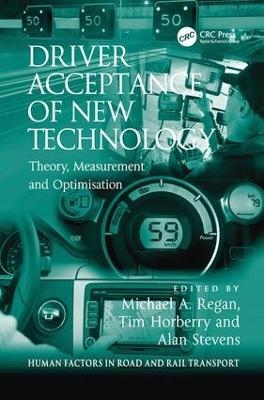
Driver Acceptance of New Technology
Ashgate Publishing Limited (Verlag)
978-1-4094-3984-4 (ISBN)
Michael A. Regan is a Professor in Transport and Road Safety (TARS) Research in the School of Aviation at the University of New South Wales, in Sydney, Australia. Before that he held research appointments with the French Institute of Science and Technology for Transport, Development and Networks (IFFSTAR) in Lyon, France, and the Monash University Accident Research Centre in Melbourne, Australia. Mike’s current research interests focus on human interaction with and acceptance of advanced driver assistance systems, driver distraction and inattention, use of instrumented vehicles for naturalistic observation of driving behaviour, and aviation safety. He sits on the editorial boards of five peer-reviewed journals, including Human Factors, is the author of more than 200 publications, including two books, and sits on several expert committees in transport safety. He is the 25th President of the Human Factors and Ergonomics Society of Australia. Tim Horberry is Associate Professor of Human Factors at the University of Queensland, Australia. He is also a Senior Research Associate at the University of Cambridge, UK, and before that he was at the UK's Transport Research Laboratory. Tim has published his work widely, including four books published either by Ashgate or CRC press: The Human Factors of Transport Signs (2004) and Human Factors in the Maritime Domain (2008), Understanding Human Error In Mine Safety (2009) and Human Factors for the Design, Operation and Maintenance of Mining Equipment (2010). Tim has undertaken many applied human factors research projects in Australia, the UK and Europe for organisations such as the European Union, Australian Research Council and the UK Department for Transport. Currently Tim is leading several projects in the minerals industry that are examining acceptance of new technology for mining vehicles - including collision detection systems or shovel automation. Alan Stevens is Chief Research Scientist and Research Director, Transpor
Contents: Part I Introduction: Driver acceptance of new technology: overview, Michael A. Regan, Alan Stevens and Tim Horberry. Part II Theories and Models of Driver Acceptance: The definition of acceptance and acceptability, Emeli Adell, András Várhelyi and Lena Nilsson; Modelling acceptance of driver assistance systems: application of the unified theory of acceptance and use of technology, Emeli Adell, András Várhelyi and Lena Nilsson; Socio-psychological factors that influence acceptability of intelligent transport systems; a model, Sven Vlassenroot and Karel Brookhuis; Modelling driver acceptance: from feedback to monitoring and mentoring systems, Mahtab Ghazizadeh and John D. Lee. Part III Measurement of Driver Acceptance: How is acceptance measured? Overview of measurement issues, methods and tools, Emeli Adell, Lena Nilsson and András Várhelyi; Measuring acceptability through questionnaires and focus groups, Eve Mitsopoulos-Rubens and Michael A. Regan; The profile of emotional designs: a tool for the measurement of affective and cognitive responses to in-vehicle innovations, Robert Edmunds, Lisa Dorn and Lee Skrypchuk; An empirical method for quantifying drivers’ level of acceptance of alerts issued by automotive active safety systems, Jan-Erik Källhammer, Kip Smith and Erik Hollnagel. Part IV Data on Driver Acceptance: Case Studies: Driver acceptance of in-vehicle information, assistance and automated systems: an overview, Gary Burnett and Cyriel Diels; Driver acceptance of electric vehicles: findings from the French MINI E study, Elodie Labeye, Corinne Brusque and Michael A. Regan; User-centred design and evaluation as a prerequisite for the success of disruptive innovations: an electric vehicle case study, Roman Vilimek and Andreas Keinath; Motorcycle riders’ acceptance of advanced rider assistance systems, Véronique Huth; Driver acceptance of technologies deployed within the road infrastructure, Alan Stevens and Nick Reed; Operator assistance o
| Erscheint lt. Verlag | 12.2.2014 |
|---|---|
| Reihe/Serie | Human Factors in Road and Rail Transport |
| Sprache | englisch |
| Maße | 156 x 234 mm |
| Gewicht | 839 g |
| Themenwelt | Informatik ► Software Entwicklung ► User Interfaces (HCI) |
| Technik ► Fahrzeugbau / Schiffbau | |
| ISBN-10 | 1-4094-3984-4 / 1409439844 |
| ISBN-13 | 978-1-4094-3984-4 / 9781409439844 |
| Zustand | Neuware |
| Haben Sie eine Frage zum Produkt? |
aus dem Bereich


